- Home
- Lise McClendon
Painted Truth Page 22
Painted Truth Read online
Page 22
“I need to talk to you,” I whispered, positioning Eden between me and the front door. I took her arm, making her listen. “It’s important.”
“I have to do this before it rains.” Her voice was icy, shaking off my hand.
“Eden, has Pete ever mentioned a studio? A storage garage? Something like that?”
She shook her head. “If you’re not going to help, get out of the way. It’s going to storm.”
“Does Pete have a storage locker? Think, Eden.”
She cocked her head. “I don’t know.” She moved around me, the wet equipment dripping on her feet.
I tried to think of the one thing that would link Pete with Ray. The dog leash was something, but I needed more, hard evidence. “Does he have a motorcycle?”
She laughed. “He hates motorcycles.”
“What about brushes and paints?”
“What are you talking about?”
“Think, Eden, did you ever see him with paint on—” I stopped, remembering the night I sat confused in front of the Stagecoach Bar after Paolo had dropped his bomb on me. Pete had smelled like turpentine, his shirt splotched with white. White paint, I realized now.
“Did you talk to Pete about Ray? About your involvement with Ray? Your romantic involvement.”
Eden blinked, staring at me, then squinted. “Of course not.” She picked up a wet suit and flung it over her shoulder.
“Have you talked to him about the fire?”
“Well, yeah,” she conceded. “He asked me. He kind of had it figured out, that the fire was planned, and I—”
“Wait. He told you how the fire had been done?”
“Yeah, sort of.”
I looked at my watch. “Don’t tell him we talked. Please. He’s a dangerous man, Eden. He set the fire. Don’t you see?”
She stared at me, her face unflinching and hard. “You’re sick, Alix. It was just on the radio. I know all about it.”
I blinked. On the radio?
“Oh, don’t tell me you didn’t know about it,” Eden sneered. “I don’t really think you were involved, but maybe you were. You and Paolo are always so cozy. They found all the supplies, even a finished painting in Paolo’s garage. And gas like the kind used in the fire. They just had it on the radio. The FBI is looking for him now.”
The thunder rumbled far above. Menacing flashes of light sparked below the clouds. I felt struck already. A pain in my gut, like a knife, twisted.
“Paolo was the one who helped me figure out the paintings were forgeries.”
“Good cover, I’d say. Keep it up,” Eden said, turning toward the house with her arms full. “I’ll tell Pete you have such confidence in him. He’ll like that.”
I STUMBLED BACK to the Saab and was on the highway before the outrage set in. Only my concern for Paolo kept me from marching into the house and telling Pete Rotondi I knew everything about his little scheme. Only, it wasn’t little. The scheme was draconian in its planning, twists, and covers. The people he used: the cowboy, Ray number one (whoever he was), Wally, Esther, Eden. Now Paolo. He used them all in his tight web.
But I didn’t know everything. I didn’t know enough to take Pete Rotondi to the cops. And he knew it.
AFTER DRIVING TOO fast back into town, I cruised by Paolo’s place. The street was more alive than usual, with neighbors standing in clumps, watching the three unmarked navy blue cars in front of the bungalow.
I eased by, ready to duck if any agents came out. But no one did and I drove back through the streets to the alley behind the gallery and shut off the car.
The act of turning the key left me immobile for a moment, as if my own key had been turned too. I wondered where Paolo was, if they had found him, if he was safe, if he’d turned himself in. He had run out of the gallery in such an uncharacteristic tizzy. I should have realized he was afraid. The sky was dark and the air smelled like rain. The sidewalk traffic thinned as people anticipated the storm.
My limbs felt like lead as I climbed from the Saab and up the stairs. A fresh pot of coffee, maybe a plate of angel-hair pasta. That was what I needed. A little food, some caffeine, and I’ll be a new person.
The coffee from this afternoon had fried to a black crisp in the bottom of the decanter. I had forgotten to turn off the coffeemaker. I scrubbed it for a minute, filled the machine, put in coffee, and started it up. I filled a pan with water and set it on the stove. Before turning on the heat, I remembered the radio. I sat down in front of the stereo, flipping on the local station.
Rock music. I’d have to wait until six to get a report. I could smell the coffee now as I sank back in the sofa. Coffee and pasta and the news. That was what I needed.
I don’t remember closing my eyes, or know how long I slept. My body let me down, demanding rest when I most needed to stay awake. It stole those minutes, those precious minutes when I could have changed the way things turned out. But by the time I woke up, the die was cast.
21
HE SAT IN the chair, very still. Black leather pants with silver studs down the side seam, his zippered jacket hanging open, revealing his bare chest. Biker boots, chained and dusty. My eyes moved gradually to his face, the hard eyes, the wind-tossed hair, the sunburned nose.
Pete Rotondi held a gun in his right hand, casually on his knee. It was a small gun, the kind you could conceal easily in your clothing, and it almost looked too small for his hand. He looked so much like a kayaking instructor, and yet, more like a road warrior. Even more like someone with a score to settle.
I woke up fast, pulling my legs under me on the sofa. His cold expression revealed only the depth of his disregard.
“How did you get in here?” I said when my voice returned.
“Walked.” He blinked lazily, then got up and turned off the music. “Get up. We’re going for a ride.”
“Where?”
“You’ll see. Get up.” He waved the gun around. I stood up.
“On the Harley? Because I really don’t like motorcycles. I’ve got this thing, you know. My father, bless his soul, used to say I should just cut off one leg if I was going to ride motorcycles—”
“Shut up. Get your keys.”
I heard myself babbling and tried to calm the drumming in my chest. I picked up my keys from the kitchen counter. “Do you want coffee? I just made a pot.”
“Get out the door.” He was waving the gun again. I guessed he didn’t want coffee.
Down the stairs Eden waited in the Saab. She sat in the front passenger’s seat, her head down. When I got in the driver’s seat, she looked up. Her face was red, streaked with tears. A nasty lump was growing under her right eye.
“Are you all right?” I whispered, as Pete got in the backseat, positioning his gun at my back.
Eden glanced back at Pete. “I can’t believe this is happening.”
“Shut up and drive.” Pete poked the gun in my back. “You both talk too much.”
I glanced at Eden. If I hadn’t told her my suspicions, she wouldn’t be here. Why couldn’t I have waited, presented the hard evidence to the Feds? Carl was right. I can’t keep my nose out of other people’s business, can’t let the cops do their job. As I followed Pete’s directions, I slumped in my seat, my knuckles white on the steering wheel.
“Faster,” Pete said. I had been going about thirty on the highway leading through the Snake River Canyon, slowing for turns, hoping for God-knows-what kind of miracle to save us.
I straightened up. “This car only goes so fast.” I began to think again. Where was he taking us? To Star Valley? “Are you giving up, then, Pete? Is the jig up?”
“Just drive.”
“If you kill us, and Wally, nobody will be buying Wally’s paintings for a long, long time. They’ll know something was funny about them. And they’ll be hung up in probate.”
“Wally?” Eden asked.
“Ray’s cousin. Pete set him up with a bunch of fake Tantros to sell after Ray died. Pete’s quite an artist.”
; “You did those fakes in the Timberwolf?” Eden turned back to Pete.
“Pretty bad, huh,” Pete said.
“Awful,” I said. “Why’d you have to make them so bad?”
“Part of the plan. You wouldn’t understand.”
“Try me.”
“Just drive.”
“How’s this? You made the forgeries so bad so that people would remember how good Ray used to be, long ago, and get to wondering if there were any good ones still around. Then, bingo, the good ones show up for sale.”
Eden looked over her shoulder at him. “You had to kill Ray to sell the paintings?” Her eyes filled, spilling tears down her face. “You murdered him?”
It was probably good that Pete wasn’t in position to slap Eden again, because from the look on his face in the rearview mirror, he was thinking about it.
“He didn’t kill Ray,” I said. “He killed two people that he wanted people to think were Ray. I haven’t figured that part out, Pete. Who was that first guy in the fire?”
Pete didn’t answer. We were entering the tightest part of the canyon, where the steep shoulders dropped off into the river below, down long, rocky banks. It was close to here where the lug nuts had loosened; Pete’s doing. A shiver went up my spine. He had almost killed us once.
“Pull off here,” said Pete. “To the left, that road.”
Foot on the brake, I steered onto a dirt road that disappeared into a grove of Douglas firs, hoping irrationally that a blown tire would save us. But I’d put on those new tires. Not that a flat would make any difference; Pete was a man who had made up his mind. The realization of that had a calming effect and my mind cleared. Thor, the mighty warrior god, never balked at the prospect of death. It was inevitable, as natural as breathing and babies. A warrior accepts that. The words from my old Edith Hamilton: Men and women who go steadfastly forward to meet death, often deliberately choose it, even plan it beforehand. The only light in the darkness is heroism.
I didn’t feel like a hero; I felt mortal, my heart thumping, my breath tight. I didn’t choose this fate, although it has always been there, for each of us, a bookend to our brief, tumultuous, joyful lives. As we entered the shadows of the firs, Eden began to sob, low and inconsolable.
“Stop here,” Pete demanded. I braked by an opening in the trees. The sound of the river far below, out of view, was not comforting. “Get out.”
I opened the car door and found my footing on the rocks embedded in the roadbed, rocks the size of baseballs, dredged up from the river bottom. Eden sat hunched over, her head in her hands.
“Come on, Eden,” I whispered. “Get out with me.”
“Let her stay,” Pete said, slamming the car door behind him, gun pointed at me. He looked strange with a gun, this pole-and-paddle guy. He didn’t look like the Pete Rotondi I had known, in skintight leathers, his placid face transformed by fury and duty.
“You stand over there.” He indicated the back of the car, by a clump of yellow bark willows. As I walked around, he got in the driver’s seat, one boot dragging out the open door. He put the car in neutral, letting it roll toward the sharp edge of the bank. He pulled the parking brake when it was six inches from going over.
Pete turned to get out. I could see through the oval back window that Eden was saying something, her hands in the air. She grabbed his arm, screaming, calling him names, but he was stronger. He hit her across the face again with the gun in his hand. She screamed again and slumped back in the seat. I should run, I thought. I could run now, while Eden distracts him. But could I leave her there? Would Thor run like a rabbit?
Pete’s face was flushed when he emerged from the Saab, his breath fast. Good for Eden. Give him a little run for his money. I wasn’t afraid of him finally. I knew he would kill me if he could. But I wasn’t afraid.
Man is born to sorrow as the sparks fly upward. To live is to suffer. The only solution to the problem of life is to suffer with courage.
Courage, I thought as a shiver went up my spine. Courage. Pete could make me suffer, but he could not make me afraid.
He moved toward me, brandishing the gun. “Get in the car.”
His plan came clear. Make our deaths look like accidents. He was clever, killing his victims in different ways, never leaving tracks or patterns.
“No.” I folded my aims as he danced nervously in front of me, glancing at the Saab.
He moved toward me. I backed away. In his heavy boots he walked awkwardly on the rocks and I was fast. He grabbed for me and missed.
“Just shoot me, Pete. I’m not getting in that car.”
He lunged at me, grabbing my ankle on his way down. I fell hard, bones hitting rocks all the way down, then scrambled to my feet. He was up too, with his big hand around my arm. “Now get in the car.” His breath was heavy.
I struggled to get away, but his grip was unyielding. I groaned, unable to talk, then, by reflex, turned and kneed him in the groin. His hand loosened as he doubled over, moaning. I jumped away, running.
Then the shot rang out, near my head, my ears, sailing by me into the trees. I stopped, my breath so tight it hardly came. Down below on the river a burst of laughter from a passing raft seemed to mock me.
“Turn around and get in the car,” Pete growled, his voice on the edge of patience. I turned. He stood hunched, still in pain. I was glad for his pain.
“You’re going to have to shoot me, Pete. I’m not getting in the car.”
Something moved in the bushes beyond Pete. I tried not to move my eyes. Pete told me again to get into the car, punctuating it with another high shot into the trees. I looked harder into the trees, hoping it wasn’t a moose or a skunk or a tourist with a weak bladder.
Paolo stuck his head out from behind a fir. His face was pinched with worry and tension. Slowly he moved closer to Pete’s back.
As Eden opened her car door, sticking her foot out, Paolo made his move. Pete saw me watching her and glanced away from me. Paolo jumped on Pete from behind. But Pete didn’t go down, and he and Paolo did a mad dance of piggyback. They grunted and swore. The gun was still in Pete’s hand, thrashing wildly. Pete backed up to the Saab and slammed Paolo into it. The car jumped forward, one tire now hanging off the edge. Eden screamed. Paolo groaned but hung on.
The gun, the gun. I knew if we could disarm Pete, between the three of us, we could gain control. But the gun in Pete’s hand was his ace, waving wildly despite Paolo’s attempts to reach it. I moved from one side to the other, trying to stay out of range and find a chance to grab it.
Pete bent at the waist, sending Paolo sailing over his head to the ground. I ran to him, kneeling, helping him sit up. He winced, then sprang up to his feet.
“Give me the gun, you son of a bitch.”
Pete smiled through his teeth. He was breathing hard but on his feet, facing us. “I’ll give it to you.”
“Wait,” I said, holding Paolo’s arm. “You need Paolo to be the fall guy.”
Pete tipped his head back, flipping his hair off his forehead. “Plans change. Just like with Gil. He never should have gone out of town.”
“Gil?” I said. Was that the cowboy?
“Having some pal of his watch his place. Didn’t he think that the schmuck would have to know?” Pete squinted at us, backing up as Eden joined us, sliding along the back end of the Saab. She took Paolo’s hand, shivering.
“So you killed the pal in the fire?” This was the part I never understood. Gil, the cowboy, had gone out of town, presumably to the rodeo in Cheyenne. He had his friend house-sit, without checking it out with Pete. Gil must have hated being a limp-wristed artist after riding wild bulls.
“He knew too much. Burning those abstracts was a bonus.”
“You killed him and burned my gallery?” Eden squeaked, her face ashen against her damp brunette curls. She slumped against Paolo’s other arm.
“Don’t give me that shit,” Pete sneered. “You arranged it. You wanted out. You killed him as much as I did.”
Eden buried her face in Paolo’s shoulder. I opened my mouth to defend her but decided against it. It was useless now. Paolo stood motionless, not pushing her off but not comforting either. His eyes were glued on Pete’s gun.
“Enough. Get in the car,” Pete ordered.
“We’re not getting in,” Paolo said, his voice deep and sure. I stared at him. Somehow I never thought of him as the brave type. Arrogant, bossy, but brave? Well.
“You’ll have to shoot all of us,” I said, my chest so tight breathing was difficult. “Then you’ll have some explaining to do. Who’d you steal that gun from, Pete? I only had one.”
Pete reddened, his temper rising from his neck onto his smooth, tanned cheeks. It occurred to me, in that moment, that making him angry was the wrong thing to do. But I would not go easily. No, I would have courage, with my steadfast friend at my side. Courage to the end, amigo.
The three of us stood watching him, frozen to the ground. He brought the gun up level to his waist. The squeeze of the trigger rippled his hand muscles as the sound burst in the cool forest air, a hot streak. I stood still, waiting for the pain. When my ears stopped resounding from the shot, I heard Eden wailing.
She was kneeling over Paolo. A crimson stain on his blue silk shirt grew, spreading from his stomach. He lay on the ground, gasping for breath, staring at the sky.
“God, no!” I dropped to my knees. “No, Paolo.” I pressed on his wound, trying to stop the bleeding. I felt a fresh breeze come up from the river, a smell of brine and fish and newly melted snow. All the things I loved paraded across my mind. Here on the ground, this reality was too true to grasp. Too awful to think past. My hands pressing into his lifeblood, I wanted to tell him how I had loved him, how the best parts of my life were with him, how I had missed him. I felt the tears on my face, watched them fall onto his chest.
My hands were wet with blood. I could feel his pulse against them, the surging of life slowing. No, no, Paolo, hang on. Please, God.
Paolo looked at me, his eyes focusing for a moment.
“Don’t leave me, Paolo. I need you. Stay with me. Stay, please.” My eyes clouded with tears.

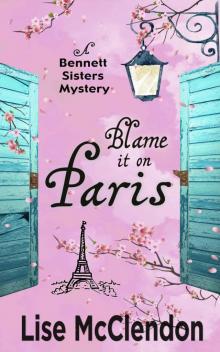 Blame it on Paris (Bennett Sisters Mysteries Book 7)
Blame it on Paris (Bennett Sisters Mysteries Book 7)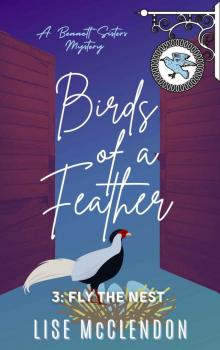 Birds of a Feather: 3: Fly the Nest (Bennett Sisters Mysteries Book 16)
Birds of a Feather: 3: Fly the Nest (Bennett Sisters Mysteries Book 16)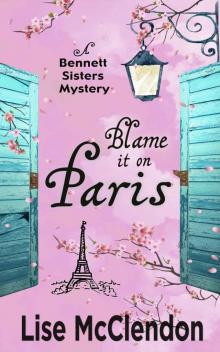 Blame it on Paris
Blame it on Paris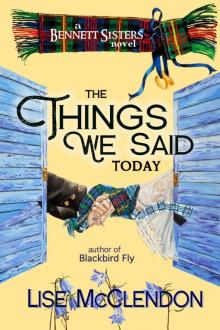 The Things We Said Today
The Things We Said Today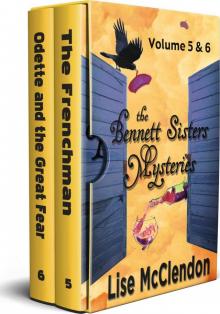 Bennett Sisters Mysteries Volume 5 & 6
Bennett Sisters Mysteries Volume 5 & 6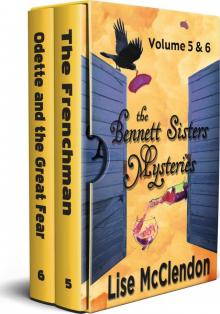 Bennett Sisters Mysteries Box Set 2
Bennett Sisters Mysteries Box Set 2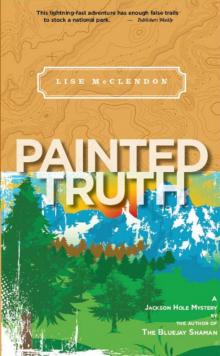 Painted Truth
Painted Truth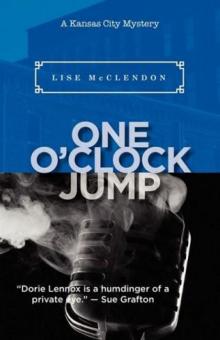 One O'Clock Jump
One O'Clock Jump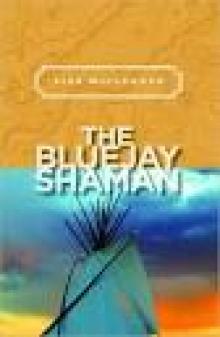 The Bluejay Shaman (Alix Thorssen Mystery Series)
The Bluejay Shaman (Alix Thorssen Mystery Series)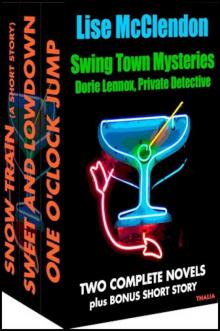 Swing Town Mysteries Dorie Lennox Box Set
Swing Town Mysteries Dorie Lennox Box Set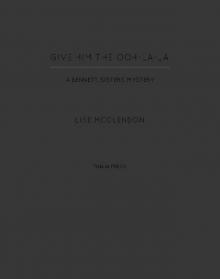 Give Him the Ooh-la-la
Give Him the Ooh-la-la Blackbird Fly
Blackbird Fly All Your Pretty Dreams
All Your Pretty Dreams Nordic Nights (The Alix Thorssen Mysteries)
Nordic Nights (The Alix Thorssen Mysteries)